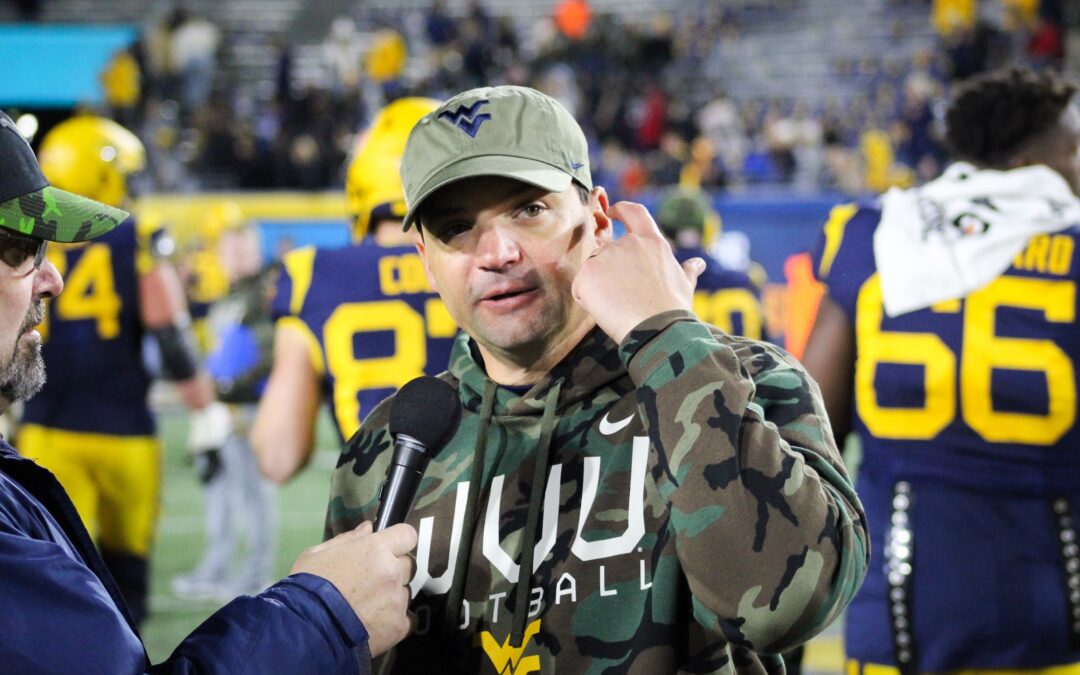
Report: Neal Brown Finally Finds Solution to WVU Football’s Pass Defense Woes
For much of the 2024 season, West Virginia University’s football team struggled to overcome a glaring weakness in its pass defense. In a conference dominated by prolific passing offenses, the Mountaineers’ inability to contain aerial attacks left them vulnerable in critical games, costing them valuable opportunities. However, head coach Neal Brown appears to have found the answer to this lingering issue, sparking newfound optimism for the program as it heads into the final stretch of the season.
### **A Season of Struggles**
The Mountaineers’ secondary had been one of the team’s most significant concerns. Going into Week 10, WVU ranked near the bottom of the Big 12 in passing yards allowed per game, regularly surrendering over 275 yards to opposing quarterbacks. Big plays, blown assignments, and miscommunication in the defensive backfield became all too familiar, frustrating fans and the coaching staff alike.
These struggles were particularly painful in games against high-powered offenses like Oklahoma and Texas, where WVU’s secondary was picked apart despite solid performances from the front seven. The defensive line consistently applied pressure on opposing quarterbacks, but the secondary’s inability to hold up in coverage negated those efforts, allowing offenses to exploit gaps downfield.
### **The Turning Point**
Neal Brown and defensive coordinator Jordan Lesley recognized that changes needed to be made—and quickly. Following a crushing loss earlier in the season, the coaching staff revisited every aspect of the defense, from personnel decisions to schematic adjustments.
The turnaround began with a simplified approach to defensive schemes. Brown and Lesley opted to reduce the complexity of coverage assignments, allowing players to focus on fundamentals. “We realized that we were asking too much in certain situations,” Brown admitted. “Sometimes less is more, and simplifying our schemes allowed our guys to play faster and with more confidence.”
The coaching staff also emphasized communication during practices, ensuring that defensive backs and safeties were always on the same page. This change was paired with increased film study, helping players recognize offensive tendencies and adjust their positioning accordingly.
### **Key Personnel Changes**
Personnel adjustments also played a critical role in the improvement. Senior safety Marcus Bell was moved into a hybrid role, allowing him to play closer to the line of scrimmage and provide additional support in coverage. Meanwhile, sophomore cornerback Malik Jackson, whose athleticism had flashed earlier in the season, was given a starting role, bringing much-needed energy and agility to the secondary.
Additionally, the Mountaineers leaned on true freshman Caleb Simmons, a highly touted recruit who had previously seen limited snaps. Simmons responded with an impressive performance, recording a key interception and multiple pass breakups in his first start.
“Caleb is a playmaker,” Brown said. “He’s young, but he doesn’t shy away from the moment. Putting him out there gave us a spark, and that’s exactly what we needed.”
### **Results on the Field**
The changes were evident in the Mountaineers’ recent victory over a top-tier opponent. The WVU secondary held its ground, limiting the opposing quarterback to just 185 passing yards while forcing two interceptions. The defensive backs looked more confident and cohesive, shutting down deep routes and forcing offenses to rely on short passes.
The improved pass defense also allowed the Mountaineers’ front seven to shine. With tighter coverage downfield, the defensive line had more time to get to the quarterback, resulting in four sacks and several hurried throws.
“We played as a unit,” Bell said after the game. “Everyone knew their assignment, and we trusted each other to execute. That’s what made the difference.”
### **A New Path Forward**
While one strong performance doesn’t erase the season’s earlier struggles, the improvements have given the Mountaineers renewed hope as they chase postseason success. With confidence building in the secondary, WVU is better equipped to handle the challenges posed by the high-flying offenses in the Big 12.
Neal Brown, often criticized for his team’s inconsistency, now finds himself being praised for his adaptability and willingness to make tough decisions. “It’s never too late to fix things,” Brown said. “We’re not perfect, but we’re moving in the right direction, and that’s what matters most.”
### **Looking Ahead**
As WVU prepares for its remaining games, the team’s rejuvenated defense could be the key to finishing the season on a high note. The Mountaineers will face another test in their next matchup, but with a revitalized secondary and a coach who has proven he can make adjustments, they seem poised to compete at a higher level.
For Neal Brown, the ability to find a solution to one of WVU’s most pressing issues could mark a turning point in his tenure with the Mountaineers. If the team’s pass defense continues to improve, it could not only salvage the current season but also lay the foundation for long-term success.





